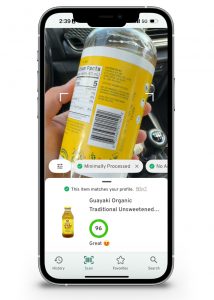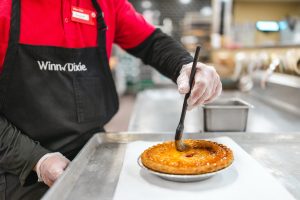
Channel Business
UNFI, GreenChoice Partner on Heathy Shopping App
 United Natural Foods, Inc. has partnered with GreenChoice, PBC, the food intelligence company, to expand its offering of healthy shelf labels and healthy shopping technology, providing independent retailers with plug and play options to improve personalization and transparency on the shelf. GreenChoice’s shelf tags and white-label app enable retailers to help their customers easily find foods that meet their health needs and lifestyle values, which is especially relevant as consumers continue to prioritize health, wellness, and sustainability.
United Natural Foods, Inc. has partnered with GreenChoice, PBC, the food intelligence company, to expand its offering of healthy shelf labels and healthy shopping technology, providing independent retailers with plug and play options to improve personalization and transparency on the shelf. GreenChoice’s shelf tags and white-label app enable retailers to help their customers easily find foods that meet their health needs and lifestyle values, which is especially relevant as consumers continue to prioritize health, wellness, and sustainability.
“GreenChoice’s shelf labels not only help shoppers identify and access healthy food options, but they also help retailers increase sales and gain trust and loyalty from their shoppers,” said Matt Eckhouse, President of UNFI Digital and Professional Services. “This is a great addition to our UNFI Digital and Professional Services offering, which helps grocery retailers differentiate their businesses and drive growth.”
GreenChoice, PBC provides nutrition and sustainability data solutions for the grocery industry, giving food retailers instant access to science-based food health and sustainability scores, as well as verified attribute data on over 1 million food products. Through UNFI’s new program, retailers have an easy way to help their shoppers navigate their assortments with shelf tags that highlight key product features, as well as GreenScores – an evidence-based rating system that makes healthy choices easy. The food GreenScore assesses and scores foods across science-based industry standards for nutritional density, ingredient processing, ingredient safety, and climate footprint. By scanning QR codes, shoppers can dig deeper into a food’s GreenScore and get personalized recommendations for healthy alternatives when desired.
In addition to on-the-shelf product information, GreenChoice offers grocers a white-label mobile web application that lets their shoppers scan foods and search a store’s inventory for products that fit their dietary and health requirements.
“Across the United States, shoppers increasingly demand product transparency and healthier options. This is a big opportunity for food retailers to help identify the foods that match shoppers’ health and sustainability needs using a third party like GreenChoice,” said Galen Karlan-Mason, GreenChoice CEO and Founder. “We’re excited for UNFI retail partners to tap into GreenChoice’s food assessment and shopping technology, which has proven to drive measurable sales lifts while improving shopper satisfaction.”
UNFI Digital and Professional Services help grocery retailers differentiate their businesses with a portfolio of services and solutions that enable them to save money, improve operational efficiency, optimize their assortments, and drive sales. Solutions include credit card processing, equipment procurement, coupon processing, in-store shelf management, planograms, point-of-sale and frictionless checkout technology, store remodels, and much more. These offerings help retailers differentiate and compete in a dynamic marketplace.
For more news of interest to the foodservice industry, subscribe to Gourmet News.
Southeastern Grocers Wins 6 Blue Ribbons at Pie Championships
 Southeastern Grocers, parent company and home of Harveys Supermarket and Winn-Dixie, is serving up sweet success with six first-place blue ribbon awards at the prestigious National Pie Championships, the premier pie-baking competition hosted by the American Pie Council. These wins showcase the grocer’s commitment to high-quality, affordable desserts that serve as the perfect pairing for spring and upcoming Easter gatherings.
Southeastern Grocers, parent company and home of Harveys Supermarket and Winn-Dixie, is serving up sweet success with six first-place blue ribbon awards at the prestigious National Pie Championships, the premier pie-baking competition hosted by the American Pie Council. These wins showcase the grocer’s commitment to high-quality, affordable desserts that serve as the perfect pairing for spring and upcoming Easter gatherings.
Competing against top industry bakers across North America, the following SEG pies earned a slice of glory in the Commercial Baker division:
- Caramel Apple Pie, 8-inch
- Chocolate Cherry Pie, 8-inch (select stores)
- Peaches and Cream Pie, 8-inch (select stores)
- Pecan Pie, 10-inch (seasonal offering)
- Pumpkin Pie, 8-inch (seasonal offering)
- Sweet Potato Pie, 8-inch (seasonal offering)
Dewayne Rabon, chief merchandising officer for Southeastern Grocers, said, “These awards are the cherry on top of our passion for crafting exceptional dessert experiences for our customers with traditional recipes that celebrate the spirit of each season. Taking home six first-place blue ribbons from the American Pie Council for our exclusive pies is a sweet reward for our dedicated team and reaffirms our commitment to delivering fresh, quality products at prices everyone can enjoy. We don’t just bake pies; we create smiles by the slice, and we are honored to be recognized for our product excellence in the industry.”
Crafted with care and culinary expertise, SEG’s caramel apple pie has become a beloved choice for both customers and APC judges. Its outstanding quality and irresistible flavor led to victories in five of the annual competitions since 2017, solidifying its reputation as a top contender in the realm of pie excellence.
Complementing the grocer’s winning pies are SEG’s new frozen desserts from its Own Brand lines Know & Love, Prestige and SE Grocers. Among these delights, Prestige offers its limited-edition ice cream flavors including Prestige Strawberry Cookies & Cream through the end of April, which features the grocer’s award-winning strawberry ice cream with crushed, crème-filled cookies. Prestige S’mores Trio ice cream, featuring Neapolitan-style chocolate, marshmallow and graham cracker-flavored ice cream, debuts in stores in May for a limited time. SEG is also introducing brand new Prestige flavors including Cherry Vanilla ice cream, Piña Colada sorbet, Chocolate Trio ice cream and Mint Chocolate Chip frozen yogurt. Additionally, SE Grocers Vanilla Sundae Cones and Vanilla Caramel Sundae Cones are also ice cream fan favorites. With these new and returning frozen treats, everyone can enjoy the refreshing and delightful flavors of spring.
Dedicated to delivering both quality and value, SEG’s line of Own Brand products – Essentials, SE Grocers, Prestige and Know & Love – offer nearly 8,000 items to help customers save an average of 20% compared to national brands, providing affordability without compromising quality. Know & Love, the grocer’s private clean label product line, was recognized within the product innovation category in Store Brands 2024 Game Changers awards, reinforcing the grocer’s dedication to providing affordable, high-quality options. Last year, SEG’s Own Brand products and market-exclusive lines garnered more than 100 awards to further demonstrate its commitment to meet customer demand for transparency and excellence.
Southeastern Grocers also continues to offer customers significant savings through its Rewards program, which recently earned high marks for the fifth consecutive year in Newsweek’s ranking of America’s Best Loyalty Programs 2025. Customers can simply activate exclusive percent back offers and discover personalized digital coupons through the Harveys Supermarket and Winn-Dixie mobile apps, providing savings on the products they love and need the most. SEG’s award-winning pies and Own Brand frozen desserts are available for purchase in stores and online through the Harveys Supermarket and Winn-Dixie websites.
For more news of interest to the grocery industry, subscribe to Gourmet News.
Southeastern Grocers, Customers Donate $107,750 to Children’s Hospitals
 Southeastern Grocers, parent company and home of Harveys Supermarket and Winn-Dixie, together with its generous customers, is donating $107,750 to eight leading children’s hospitals across the Southeast, demonstrating the grocer’s ongoing commitment to supporting local children and their families. As part of this initiative, SEG partnered with Roc Solid Foundation to create a customized backyard playset for one special oncology patient and her family, providing a safe, joyful space for play as she continues her recovery journey.
Southeastern Grocers, parent company and home of Harveys Supermarket and Winn-Dixie, together with its generous customers, is donating $107,750 to eight leading children’s hospitals across the Southeast, demonstrating the grocer’s ongoing commitment to supporting local children and their families. As part of this initiative, SEG partnered with Roc Solid Foundation to create a customized backyard playset for one special oncology patient and her family, providing a safe, joyful space for play as she continues her recovery journey.
This month, Harveys Supermarket and Winn-Dixie customers rallied behind their local communities by donating $1, $5 or rounding up their grocery bills at checkout. Every cent raised through this community donation program will directly benefit critical hospital initiatives – from family-centered care and therapeutic programs to innovative research, child advocacy and other life-changing services.
Anthony Hucker, Chairman, president and CEO of Southeastern Grocers, said, “We take pride in playing an active role in the community with efforts extending beyond the aisles of our stores. Partnering with these exceptional children’s hospitals reflects our unwavering dedication to the health and future of the communities we serve. Together with our customers, we’re investing in world-class care, groundbreaking research and – most importantly – the lives of children and families who inspire us every day. It’s a partnership rooted in hope and driven by the shared belief that every child deserves the opportunity to thrive.”
Guided by a commitment to make meaningful impact where it matters most, SEG proudly partnered with the following eight children’s hospitals:
- Children’s of Alabama (Birmingham, Ala.)
- Golisano Children’s Hospital of Southwest Florida (Fort Myers)
- Johns Hopkins All Children’s Hospital (St. Petersburg)
- Nicklaus Children’s Hospital (Miami)
- Ochsner Children’s Hospital (New Orleans)
- Orlando Health Arnold Palmer Hospital for Children (Orlando)
- Studer Family Children’s Hospital at Ascension Sacred Heart (Pensacola)
- Wolfson Children’s Hospital (Jacksonville)
In a heartfelt extension of this commitment, SEG recently partnered with Roc Solid Foundation to build a personalized playset for a four-year-old patient of Nicklaus Children’s Hospital recovering from Medulloblastoma, a cancerous brain tumor. Due to weakened immune systems, pediatric cancer patients are often unable to use public playgrounds. A private backyard playset offers not only a safe environment to play, but a meaningful opportunity for families to create lasting memories together.
Through its partnership with Roc Solid Foundation, SEG has helped build five playsets for young patients at its stores in Jacksonville, Miami, New Orleans and Tampa – bringing moments of joy and normalcy to families when they need it most.
SEG and its compassionate customers and associates have proudly donated more than $1.2 million to support children’s hospitals across the Southeast since 2021.
For more news of interest to the grocery industry, subscribe to Gourmet News.

















